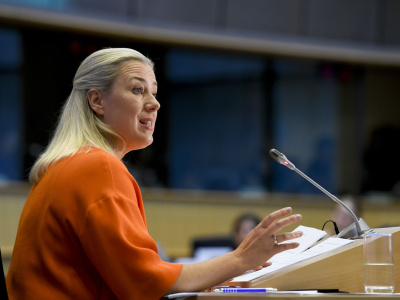
Africa-Europe relations: Time to reboot – Volume 6, Issue 5 (November/December 2017)
In this issue of Great Insights magazine, a mix of authors share their perspectives on the evolving partnership between Africa and Europe. Each of their contributions touches on key issues, ahead of the AU-EU Summit next week.
Read the articles online
EU-Africa relations – Editorial
Geert Laporte, ECDPM
At the end of November, African and European Heads of State will meet for their 5th Summit since 2000.
Ensuring a more effective and beneficial cooperation
René N’Guettia Kouassi, African Union Commission
Europe’s relationship with Africa has been governed by a number of international agreements. In the lead-up to the 5th African Union–European Union Summit in Abidjan at the end of November 2017, many questions arise. Have these agreements delivered the expected results? What should be done to build a mutually beneficial partnership?
From walls to calls: Africa and Europe can shape the future
Carlos Lopes, University of Cape Town
Walls make a lot of headlines these days. So do sea crossings. Walls signify a desire to exercise sovereign control at a time when we are experiencing an erosion of borders and enhanced human mobility. Sea crossings are a revisit of desperation routes used by those who have nothing to lose but believe they have a lot to gain. In both cases there is drama, emotions and fear.
EU-Africa: Breaking the silence and the vested interests
Geert Laporte, ECDPM
The upcoming Summit, the next months and years should provide unique opportunities for Europe and Africa to move into a different type of partnership. Will the EU and the AU seize this momentum or will the success of the Summit in Abidjan be measured by the number of participating Heads of State?
‘Africa rising’ means taking ownership of its knowledge production
Elizabeth Sidiropoulos, South African Institute of International Affairs (SAIIA)
African think tanks must move more proactively into the Africa-EU policy analysis and advice realm by exploiting the potential to collaborate with existing EU-Africa research networks. At the same time, African governments should also contribute to ‘growing their own’ by recognising the role that African think tanks can play in evidence-based research around this important strategic partnership.
A dialogue of the deaf?
Uzo Madu, What’s in it for Africa?
The European Union (EU) and Africa continue to engage in a dialogue of the deaf, in which both parties are seemingly unresponsive to what the other has to say. A ‘Normative Europe’ narrative in which the EU is the global guardian of norms and values, exporting them in its external relations, puts the EU-Africa relationship on an uneven keel. Meanwhile media bias and an Africa which engages with the EU in several different configurations means the dialogue of the deaf may well continue.
The race to close the gateway to Europe
Tasnim Abderrahim, ECDPM
As irregular migration to European countries continues, both the EU and its Member States have stepped up their efforts to reach a solution through the transit points in North Africa.
Radical innovation or muddling through?
Stefan Schepers, High Level Group on Innovation Policy Management
The European Partnership Agreements, under conclusion or negotiation with the European Union, will help to stimulate inclusive growth, but only if governments, business and centres of learning put in place the right framework conditions.
Shared values? Maybe. But how effective are they?
Léonard Matala-Tala, IRENEE/University of Lorraine
Since 2007, the African Union (AU) and the European Union (EU) have pursued the joint Africa-EU strategy (JAES), which “reflects the Euro-African consensus on values, joint interests and common strategic objectives”. At a time when both partners are working to replace the Cotonou Partnership Agreement (CPA) in 2020 and on the eve of the 5th Africa-EU Summit, it is a good moment to reflect on the effectiveness of shared values.
The world is changing: The relationship needs changing too
Jessica Ilunga, External Affairs consultant
If European countries want to safeguard their relations with Africa, they must treat the continent as an equal and valuable partner in practice and not just in rhetoric.
Technology to empower society: the BarefootLaw experience
Gerald Abila, BarefootLaw
A new generation of young African entrepreneurs are taking on the major challenges in their society, using technology and innovative thinking applied to their local context. They are providing a potential blueprint for solving other problems across the continent. In this regard the Partnership between the African Union and the European Union could play an important role if the available instruments were more flexible to reach out to these younger generations.
The AU-EU partnership for peace and security
Tim Murithi, Institute for Justice and Reconciliation
The European Union (EU) has been a long-standing partner for peace since the African Union (AU) came into existence. As the AU marks its 15th year, it is useful to reflect on what the partnership between the two continents and organisations has achieved and to identify specific initiatives for the future in terms of ongoing cooperation.
How to renew the EU-Africa Partnership through transcontinental youth networks
Yentyl Williams and Celine Fabrequette, ACP YPN
The African Union (AU) declared 2017 the ‘year of harnessing the demographic dividend through Investments in Youth’ and the European Union (EU) renewed its Youth Strategy; this is timely given the focus of the upcoming AU-EU Summit on ‘youth’.
This publication benefits from structural support by ECDPM’s institutional partners The Netherlands, Belgium, Estonia, Finland, Ireland, Luxembourg, Sweden, Switzerland, Austria and Denmark.




